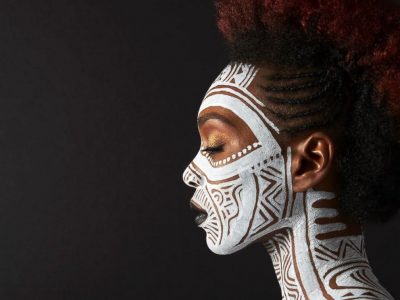Laolu Senbanjo/Equinox
By
Shola Balogun
The centreplace of poetry in the Yoruba world and Judeo-Christian vision can be said to be more of a weapon and mystical experience than an entertaining art.
Its relevance as a creative engagement lies in its relatedness to several perceptions and ability to embrace untrodden grounds. It will in no way be strange to find it hard to come to a conclusion: within Yoruba and Judeo-Christian poetries, we encounter the aesthetic and artistic archetypes of both the crossroad and the ladder – a way of seeing, which in no way embraces the absolute.
Poetry, using the traditional Yoruba symbolic meanings of the crossroad and Judeo-Christian ladder or stairway, offers insights into what constitutes consciousness of forms, synthesis, multiplicity of perspectives, and the point where the familiar meets with the unfamiliar. Poetry in this mould does not only expand the borders of thought, it preserves the events of a period, unveils the nature of its struggle, and in the same vein becomes one with protest.
In its portrayal of loneliness, exile, grief and anger, the tender and vagrant beauty of forms in the lyrical poetry of the Yoruba and Judeo-Christian creativeness take great mastery of several perceptions – seeing the beauty that is invisible to other eyes and stepping beyond the Outer court of utterances to the Inner court of deep longings for the spiritual connectedness between historical events, post-colonial expressions and communal visions of a people.
The poetic is well-pronounced where there is creative self-expression that gives a writing a ring of suspense and draws the reader into the strange but fascinating creation, to struggle to be fully awake while reading the work even when one is truly not in a state of dream.
In Yoruba sense of the word, only a selected few of all the compositions that come under the designation of what is poetry, are truly poetic. Among the Yoruba poets and poets of Jewish descent who have come to the point where the familiar meets with the unfamiliar with a profound creative imagining that captures the multidimensional keys of this essay are Adebayo Faleti, Afolabi Olabimtan, Tunbosun Oladapo, Amichai Yehuda, Nissim Ezekiel and Paul Antschel.
The test of great poetry does not lie in the classifications, sentiments, or what is known mainly about these aforementioned poets.
The test of great poetry is most revealing in the simplicity of adjectives and presences that arouse in the reader the touch of communal pool. These poets, permit me to posit with all humility, have displayed their mastery of the art of poetry with a respectable place for themselves. Their poems bear a subtler multiplicity of perspectives and dimensional eloquence that define the poetry of the crossroad.



No Comments Yet!
You can be first to comment this post!